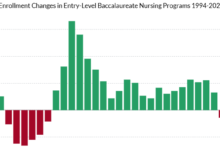Progress ‘critical’ on tackling racial discrimination in NHS

Nurses from a black and minority ethnic (BME) background are still far less likely to get hired or promoted – and more likely to be bullied or abused – in the NHS than their white counterparts, according to new data from the health service.
Latest findings from the Workforce Race Equality Standard, while showing some improvements, have sparked healthcare leaders to call again for more action on racial bias and discrimination in the NHS.
NHS England has this week published the 2023 report of the Workforce Race Equality Standard (WRES), a “snapshot” of where trusts in England are in terms of addressing race inequalities.
It stated: “This year’s report is an opportunity to take stock of some of the progress made, existing and persistent challenges and an opportunity to take lessons for improvement.”
“Specific focus is needed on providing equal opportunities for career progression and promotion for staff from a black background”
Saffron Cordery
WRES, which has published data each year since 2015, tracks the NHS against nine “indicators” of racial equality and offers insights into the difference in experiences BME staff have to their white equivalents.
The 2023 report found that, as of March last year, BME staff made up more than a quarter of the NHS workforce (26.4%) and more than a third (33.6%) of nurses, midwives and health visitors.
It pointed to an increase in BME representation at a ‘very senior manager’ level of 61.7% between 2018 and 2023, and a two percentage point rise in BME representation at executive board level, from 9% of roles to 11%.
However, the WRES researchers found that BME nurses were still significantly less likely to get hired or promoted in the NHS and far more likely to be bullied or harassed.
At 98.6% of NHS trusts, a smaller proportion of BME compared to white staff felt they provided equal opportunities for career progression and promotion.
According to the data, 41.6% of Agenda for Change band 5 NHS staff were of BME backgrounds, but then “dramatically” fell to 23% at band 6, and 17.8% at band 7 – pay bands for most nurse managers.
The WRES analysis found that this disparity was worse in London and the South West of England when compared to elsewhere in the country.
In response, NHS Confederation director of partnerships and quality Joan Saddler said it was “encouraging” to see more BME people in leadership roles, but that representation by itself would “not change power structures that lead to inequality”.
“It is crucial that these leaders remain supported to carry out their roles without fear of discrimination or harassment. It is not enough to just recruit people, we have to engage and retain them,” she said.
Meanwhile, NHS Providers deputy chief executive Saffron Cordery said that “substantial challenges” still existed for improving working conditions and career progression for BME staff.
She said: “While ethnic diversity in the NHS workforce has increased, the speed at which this is happening at board level, particularly among executives, is not keeping pace with overall diversity of the workforce.”
“This has led to a stark disparity in board representation… specific focus is needed on providing equal opportunities for career progression and promotion for staff from a black background,” she added.

Saffron Cordery
In addition, WRES found that, for all trusts, a higher percentage of BME staff than white experienced discrimination from other staff, which was consistent with previous years.
BME women were the demographic of staff most likely to have experienced harassment, bullying or abuse from colleagues in 2022.
A total of 30.7% of female BME nurses and midwives were found to have experienced it during a 12-month period.
As with previous WRES reports, a higher proportion of BME nurses and other staff experienced harassment, bullying or abuse from patients and the public at the vast majority (81%) of trusts.
However, this latest figure, dating from 2022, represented an increase of 10% on the previous year, when this was the case at 71% of trusts.
There was also a one percentage point increase in the number of trusts where a higher proportion of BME staff were being bullied, harassed or abused by staff.
WRES also reported higher than average rates of bullying, harassment and abuse experienced by internationally-educated nursing and midwifery staff from patients, relatives or the public.
Of this group, internationally recruited nurses from white backgrounds were found to have experienced the highest levels.
Internationally recruited nurses, midwives and nursing associates from BME backgrounds also experienced “high levels” of abuse and harassment from colleagues, and were far more likely to report experiencing discrimination at work.
WRES said there had been a “largely downward trend” in the disparity between the experiences of BME and white staff, but acknowledged that there was still a gap.
Unison’s head of health, Helga Pile, said the WRES report showed that discrimination was “still rife within the NHS”.
“Progress is welcome, but it’s far too slow, especially when the proportion of black health workers is rising,” she said.
“Initiatives across the NHS are needed to stop black staff being held back. They are much more likely to be disciplined and face harassment and bullying from patients and colleagues. This has to stop.”
Similarly, Pat Cullen, general secretary and chief executive of the Royal College of Nursing, described the pace of improvement as “glacial” and echoed calls for NHS leaders to make dramatic changes.
“Discrimination in the NHS is systemic – and it’s clear the health service still has a long way to go in overcoming the prejudices that both patients and staff face,” said Ms Cullen.
“It’s promising to see some progress – including an increase in the number of Black, Asian and minority ethnic staff at senior manager level – but it is not nearly fast enough,” she said.
“With white staff still far more likely than BME applicants to be appointed from shortlisting – and just two in five staff from a Black background believing their trust provides equal opportunities for career progression or promotion – it is clear that much more needs to be done.”

Pat Cullen
The WRES report found there had been only a “modest” improvement in addressing the BME disciplinary gap – referring to the lower likelihood of a white nurse or other NHS worker being referred to a formal disciplinary process – with only a one percentage point decrease in relative likelihood.
BME staff, the report also stated, were less likely to access continued professional development (CPD) and other training than their white colleagues.
Speaking after the report was published, NHS England chief workforce officer Dr Navina Evans said there were “some positive improvements” in the data, but acknowledged there was “more to do”.
She said: “With the NHS workforce more diverse than at any point in its history, progress is particularly critical.
She highlighted that the NHS equality, diversity and inclusion improvement plan set out targeted actions to address prejudice and discrimination in the workplace, including making sure every NHS board and chief executive had a measurable objective to improve the experience of staff.
Health and social care secretary Victoria Atkins added: “I want to see the NHS recruit and retain brilliant people from all backgrounds.
“It is important that the NHS at all levels represents the people it cares for, and I welcome progress in appointing more black and minority ethnic staff to senior positions and better representation of disabled people in the NHS workforce.
“Through our introduction of the first ever NHS long-term workforce plan, we are creating more opportunities for doctors and nurses here at home, which will boost the NHS workforce and the diversity within it.”





